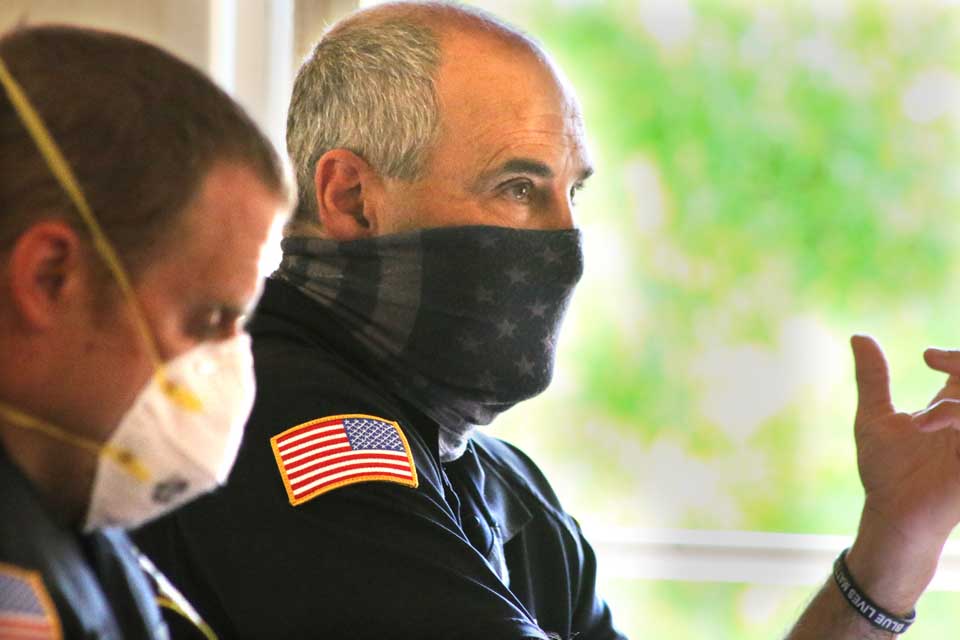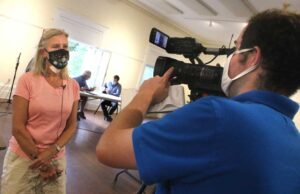Advisory Board Starts
Study Of Village Police
Department Small, Says New Chief,
But Big-City Complexities Exist Here

By JIM KEVLIN • Special to www.AllOTSEGO.com

COOPERSTOWN – At his first public appearance since being named yesterday to lead the Village Police Department, Chief Frank Cavilieri this evening made it seem simple.
 The most problematic area of policing, here as everywhere, is “use of force,” Cavilieri said this evening at the first meeting of the Police Community Advisory Board. A related issue is “how we interact with the community.”
The most problematic area of policing, here as everywhere, is “use of force,” Cavilieri said this evening at the first meeting of the Police Community Advisory Board. A related issue is “how we interact with the community.”
The good news, he continued, is that there is very little crime in Cooperstown. He described a typical month as two motor vehicle incidents, two calls, three dogs barking and two instances of criminal mischief.
But as the discussion continued between Cavilieri, Senior Patrolman Jim Kelman and six members of the CAB, brought together here and in 513 communities across the state by Governor Cuomo’s Executive Order 202, the complexities multiplied.
The big three challenges, here as everywhere, are supervision, training and ensuring officers’ mental health, the chief said.
After George Floyd’s death, “we’ve been asked to review our police department and make sure it’s fulfilling our community’s needs,” said Mayor Ellen Tillapaugh Kuch, who chaired the meeting. But her assignments at the end of the hour-long meeting in Village Hall’s ballroom suggested the complexities:
• Christ Episcopal Rector Dan Boston was assigned to approach the county Jail Ministry.
• Bassett psychologist Richard Brown, to approach the MCAT, the Mobile Crisis Assessment Team that serves Otsego and five other counties in time of emotional crises.
• At his suggestion, Cavilieri was assigned to reconnoiter the county Department of Social Service, to learn what DSS might do when such issues as homelessness intersect with lawbreaking.
• The mayor herself will reach out to Destination Marketing to see if there’s a way to explore tourists’ experience with local police.
Even in a small department like the village’s — the chief, two fulltime officers and parttimers — situations can arise, said the new chief, drawing on 27 years experience in the Suffolk County Police Department and three years before that with Houston police.
Expanding on the challenges of supervision, training, and the mental health of individual officers, he noted the latter can emerge from PTSD – officers shrugging off a fatal accident, as if facing death isn’t upsetting.
Through training, in-state police forces should be avoiding pitfalls found elsewhere. For instance, he pointed out that choke holds, responsible for deaths and community unrest elsewhere, are “N-G, no good,” having been prohibited in New York since the 1980s.
Even if George Floyd had survived the knee on his neck for nine minutes, Cavilieri added, he may have died anyway from “positional asphyxia,” cause when a handcuffed suspect is held face down for a period; in New York, officers are training to shift the suspect on his or her side, to sit up or to stand.
Hall of Fame Weekend, described as “a soft target for terrorism,” is as complex a policing challenge as is to be found anywhere. Those three days, village police are part of a complex deployment led by the Department of Homeland Security and also including the state police, the BCI and the sheriff’s department.
“Defunding” police was mentioned as a issue, but the mayor said, locally, the intent is the opposite.
When the coronarivus threat arrived in March and municipal funding became uncertain, the Village Board decided not to fund a third police-officer position — some $50,000. Rather than defund, the trustees hope to re-fund that job when economic challenges ease.
Tillapaugh, who has been on the Village Board for nine years, and Richard Sternberg, a trustee for four years, two as Police Committee chair, reported they haven’t received any complaints against local officers. Something happened 10 years ago, Sternberg said, but didn’t go into detail.
On the contrary, the mayor said, she often hears praise of local officers for their professionalism, considerateness and helpfulness.
“When you’re in our custody,” said Cavilieri, who has served as a parttime village officer for some time now, “you’re out responsibility. And you’re wellbeing is very important to us.”
Other CAB members at the first meeting were Trustee Jeanne Dewey and Adam Richter, a Bassett-Columbia medical student, Bruce Maxson, assistant public defender and former village trustee, Dr. Anush Patel, chief of oncology, Bassett Hospital, and Veronica Pokorny, who is with Paperkite Creative, were unable to attend the first meeting, but have agreed to serve, the mayor said.
She set the next meeting for 5 p.m. Wednesday, Sept. 23, with the idea of meeting every two weeks through the winter to meet the governor’s April 1 deadline for a status report.
The City of Oneonta and Otsego County Government, which funds the sheriff’s department, have each set up similar CABs, as ordered by the governor.

